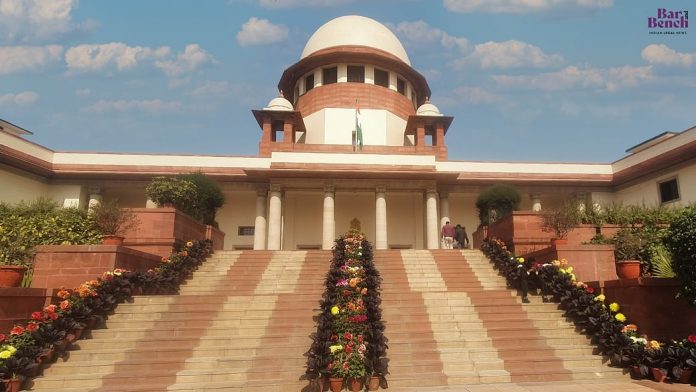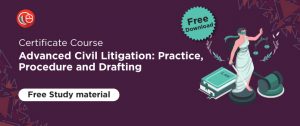
This article has been written by Yashika Kapoor, pursuing the Certificate Course in Advanced Civil Litigation from LawSikho.
Table of Contents
Introduction
Every individual needs to be cognizant of his/her legal rights. One such substantial right that the citizens must be aware of is the right of accident victims to get immediate medical assistance. This right has been enshrined in the said judgment “Pt. Parmanand Katara vs. UOI” where the need of bringing immediate medical aid to accident victims has been highlighted. As rightly observed, there have been ambiguities along with a sense of fear among people to help the victims of road accidents. This is because it has been assumed that a person seriously injured in a road accident must be helped and treated only after the completion of legal formalities. Not only this, even at times, the hospitals/medical institutions refuse to entertain such victims and provide them with treatment. Thus, seeking clarifications on this aspect, a Public Interest Litigation was filed by a human rights activist in the apex court. Following which it was considered that the right to life is of paramount importance and in cases of emergencies, such right would override the legal as well as medical formalities. Thereby making it obligatory for doctors/hospitals/medical institutions either private or public to extend their services to protect life and provide such road accident victims with immediate medical support.
Most of us must be aware of the oath (Hippocratic Oath) taken by the doctors that cast a duty upon them to preserve the lives of the injured, mitigate their sufferings, uphold the primacy of life and perform other professional duties. Thus, following the moral-ethical principles of medicine, the doctors must practice their profession without distinguishing on the basis of medico-legal cases. The medico-legal cases include victims of road accidents having some serious injury or ailment that requires the involvement of law enforcement agencies and such cases are believed to be dealt with only by certain hospitals/medical institutions that are authorized to treat victims of road accidents. However, with the help of this ruling, it has been decided that neither a road accident victim having an emergency case shall be denied with immediate medical assistance nor shall he be redirected to other medical institutions/hospitals that particularly deal with medico-legal cases. 
What happened in the case of Parmanand Katara v UOI?
Facts
Pandit Paramanad Katara, (presently a senior advocate) a human rights activist approached the Hon’ble Supreme Court of India by filing a Public Interest Litigation. The PIL was filed on the basis of a newspaper report titled ‘Law helps the injured to die’ published in Hindustan Times discussing the death of a scooterist who was knocked down by a speeding car and was refused treatment by the doctor on the ground that the particular hospital was not authorized to handle medico-legal cases. The person who happened to witness the incident and assisted the victim in approaching the nearest hospital was then redirected to visit another hospital that was at a distance of 20 km and particularly dealt with medico-legal cases. However, the victim succumbed to his injuries and died on the way. Fortunately, this news article was enough for Pt. Paramanad Katara (Petitioner) to take action and seek clarification on this law point from the Hon’ble Supreme Court. Hence, the petitioner sought for certain directions be issued to the Union of India:
- It must be compulsory that any injured victim that is brought for treatment must be immediately given medical assistance for the purpose of preserving his life.
- Only after the victim is treated, the procedural criminal law should be allowed. This shall help in avoiding any sort of negligent death.
- In case when such direction is not followed by the concerned hospital/doctor/medical institution (private or public), strict action shall be taken for the negligent act along with appropriate compensation.
Response of the opposite party
The Hon’ble Supreme Court impleaded the Secretary, Ministry of Health & Family Welfare of the Union of India, the Medical Council of India, and the Indian Medical Association as respondents. Reference was made by the Medical Council of India to clauses 10 and 13 of the Code of Medical Ethics that dealt with ‘obligations to the sick’ and ‘patients not be neglected’ respectively. As stated in Clause 10, no physician is mandated to treat all patients except those in emergencies and he must not overlook the lives of the people dependent on his skill and attention. Whereas the guiding principle behind Clause 13 is that although the physician is free to choose whom he shall serve, however, he must respond to emergency cases and especially not neglect those patients who are being treated by them.
Discussing the said issue, it was further mentioned by the Medical Council of India in their affidavit that no provision of law prevents the medical practitioners from attending to the injured. It is important to understand that the life of an individual is much more important than fulfilling the legal formalities. Also, steps must be taken to ensure that the medical practitioners are not unnecessarily dragged to court, harassed, and prosecuted for not first complying with the legal formalities in case they treat the seriously injured patients without complying with the medical and legal formalities. The Indian Medical Association highlighted the reason behind the rising death rate. The same was due to the lack of immediate medical assistance provided to such victims. Although it is quite important to secure the evidence and keep it intact, such formalities are not above the valuable life of a person. Hence, it can be viewed that there was no objection raised from the Government of India.
For better understanding one must take note of the decisions taken under the chairmanship of the Director-General of Health Services:
- It is important for the medical officer on duty to report to the constable on duty the details of the injured like his name, time and place of incidence, etc. if his case falls under the category of medico-legal.
- The treatment of the injured shall not be in any manner affected by the arrival of police officials or compliance with any other legal formalities.
- The medico-legal cases must be taken by the hospital/medical institution (both private and public) irrespective of the place of occurrence of the accident. However, if any medico-legal case is brought by the police officials, then they shall be treated by the hospitals of those particular zones.
- No person shall be denied treatment by the government. institutions/hospitals on account of the cases being medico-legal in nature.
Judgment
Deciding the said issue, Hon’ble Justice Ranganath Misra and Hon’ble Justice G.L. Oza disposed of the aforesaid writ petition filed in the nature of PIL by making the following observations:
- Article 21 of the Indian Constitution casts a duty upon the state for upholding the right of the preservation of valuable human life.
- Preservation of valuable human life is of utmost significance. This is so because when a life is lost, the status quo ante shall not be restored.
- It is not for the healthcare workers to decide and treat an individual based on his status meaning preserving his life on the basis that whether he is innocent or guilty and punishable under law. The work of healthcare workers is only limited to provide immediate medical assistance, preserve their lives without considering the status of the injured.
- Every medical practitioner working at a Govt. hospital or a private hospital or any other medical institution must provide the best treatment to the patients and extend his services with due expertise.
- Right to life is of paramount importance and so no statute or provision of law can intervene and obstruct the treatment of victims of road accidents.
- Steps were to be taken to aware people of this ruling and the rights available to them per se.
- Steps must not be taken by healthcare workers but even the police officials and citizens witnessing such road accidents must take immediate steps to preserve the life of the injured.
- The members of the bar and bench must be kept in mind the fact the crucial time of medical professionals must not be wasted. Such medical practitioners and other medical professionals must not be unnecessarily investigated, prosecuted, and harassed.
- The courts shall endeavor to not summon medical practitioners to give evidence, unless the evidence is significant, however, even if they are summoned, efforts must be taken to not waste their crucial time.
Conclusion
Article 21 of the Constitution of India provides that ‘Right to health forms an indispensable part of Right to life. “Pt. Parmanand Katara vs. UOI” is a landmark judgment that upholds the preservation of life and considers the right to life to be of utmost significance. The Petitioner filed a Public Interest Litigation observing that there were no laws governing the provision of immediate medical assistance to the victims of road accidents. Following which the Hon’ble Supreme Court directed all the medical institutions to first treat the patients and thereafter comply with the formalities laid down under criminal law. The contribution of the petitioner namely; Pandit Parmanand Katara is quite laudable. His efforts helped him to get nominated for an award considered as an alternative to Noble Prize. This landmark judgment was passed in the era when PIL was being used as a tool for bringing social change.
The idea behind raising this issue was to remove the zonal jurisdiction as an obstruction while treating the victims of road accidents. The medical practitioners are endowed with the duty to preserve the lives of the injured and thus denial of treatment on the basis of medico-legal cases was not considered as a favorable decision benefiting the public at large. Moreover, doctors being part of a noble profession have an obligation to treat the patients, provide them with immediate medical assistance and bring them out of the risk zone at the earliest.
It is pertinent to note that the observations made by the Hon’ble Supreme Court concerning calling doctors as witnesses have also been placed on record. Many times, the medical practitioners hesitate while dealing with medico-legal cases because of the fear of being summoned for providing evidence, interrogated and harassed by police officials, unnecessarily dragged to the court, and getting cross-examined. However, this judgment explicitly answers this issue as well and provides that the crucial time of medical professionals must not be wasted in unnecessary interrogations. The courts shall endeavor to not summon medical practitioners to give evidence unless the evidence is significant, however, even if they are summoned, efforts must be taken to not waste their crucial time. Thus, these observations were made in order to prevent the harassment caused to the healthcare workers.
References
- https://indiankanoon.org/doc/498126/.
- https://www.scribd.com/document/442028427/PARMANAND-KATARA-V-UNION-OF-INDIA.
- https://www.jstor.org/institutionSearch?redirectUri=%2fstable%2f43951269&refreqid=excelsior%3A71ce3fbb0f1a8c407b0b4a4dfee7dd40.
- http://www.satyamevjayate.in/road-accidents-or-murders/episode-2article.aspx?uid=s3e2-ar-a2.
Students of Lawsikho courses regularly produce writing assignments and work on practical exercises as a part of their coursework and develop themselves in real-life practical skills.
LawSikho has created a telegram group for exchanging legal knowledge, referrals, and various opportunities. You can click on this link and join:
 Serato DJ Crack 2025Serato DJ PRO Crack
Serato DJ Crack 2025Serato DJ PRO Crack









 Allow notifications
Allow notifications


